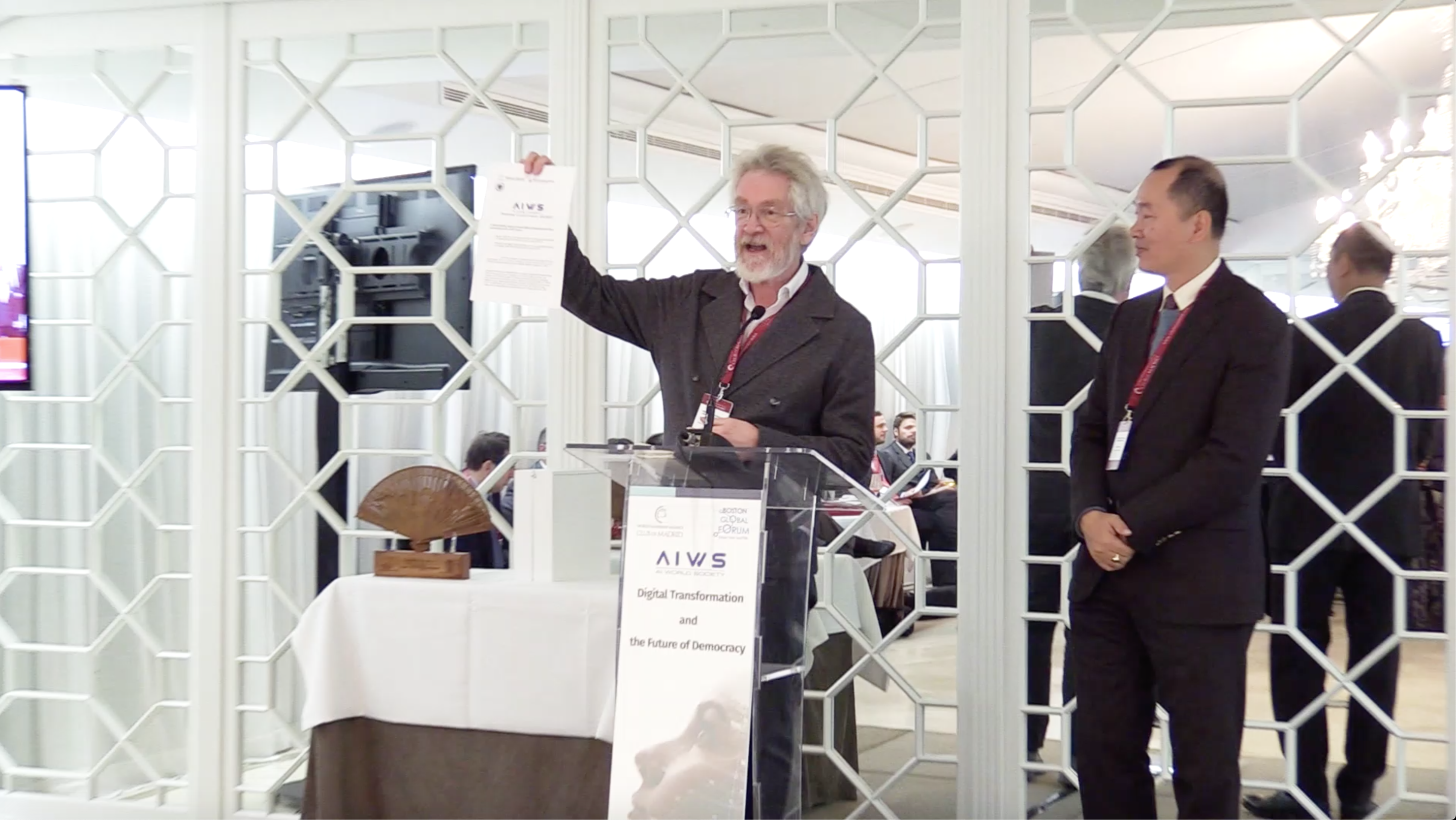
by Editor | Oct 27, 2019 | News
A new social contract is needed to blunt such developments and encourage beneficial ones. To achieve this goal, the Boston Global Forum, working with MIT Connection Science (connection.mit.edu) is developing a set of principles and guidelines that could inform the creation of a social contract for the Digital Age. We are calling it the AI World Society Social Contract 2020
We see five centers of power and responsibility that need to be taken into account in the social contract: government, citizens, firms, civil society organization, and AI assistants. In the US, where the Government has branches, the Executive, Legislative and Judicial, we foresee the emergence of seven centers of power.
And we see a need for a social contract that places a priority on transparency, privacy, and the empowerment of citizens as opposed to government.
This message was delivered by Mr. Nguyen Anh Tuan and Professor Alex Pentland at the 2019 Policy Dialogue ‘Digital Transformation and the Future of Democracy: How can Artificial Intelligence Drive Democratic Governance?’ of World Leadership Alliance-Club de Madrid on October 21, 2019.
The file can be found here.
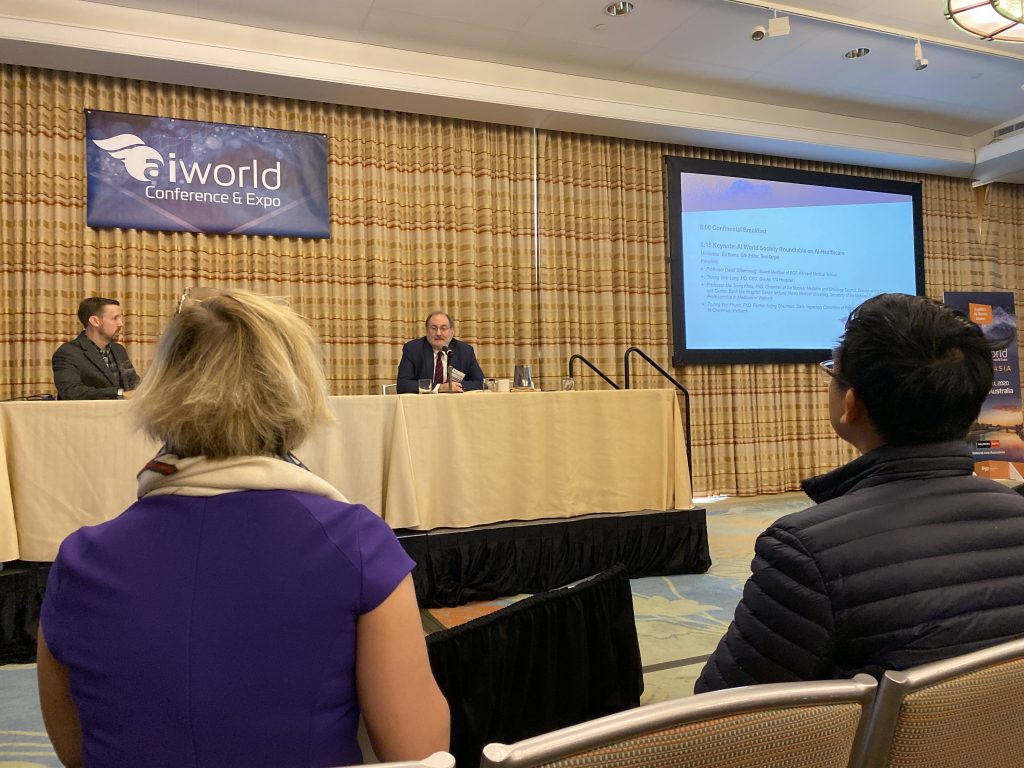
by Editor | Oct 27, 2019 | News
On the morning of October 25, 2019, Professor David Silbersweig, Harvard Medical School, Board Member of the Boston Global Forum and Michael Dukakis Institute, spoke at the AI World Society Roundtable on AI-Healthcare at AI World Conference and Expo. Professor Silbersweig introduced concepts about AI-Healthcare, a part of the AI World Society Initiative.
Now in the fourth year, AI World Conference and Expo has become the industry’s largest independent business event focused on the state of the practice of AI in the enterprise. The AI World 3-day program delivers a comprehensive spectrum of content, networking, and business development opportunities, all designed to help participants cut through the hype and navigate through the complex landscape of AI business solutions. Attend AI World and learn how innovators are successfully deploying AI and intelligent automation to accelerate innovation efforts, build competitive advantage, drive new business opportunities, and reduce costs.
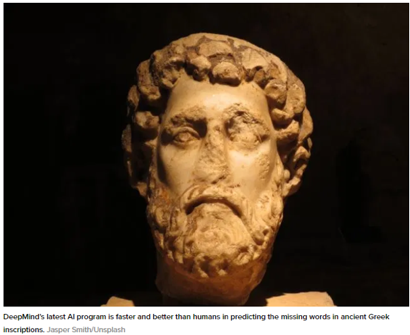
by Editor | Oct 27, 2019 | News
Google’s artificial intelligence (AI) research arm, DeepMind, made an international name for itself in 2017 when its AlphaGo program consistently beat the world’s best human Go players in the board game. Now, a new project borne out of the lab has proved that AI is also better than humans at learning words, including those long-forgotten ones dating back thousands of years.
In a recent collaboration between DeepMind and the University of Oxford, a team of computer scientists trained a set of neural networks (algorithms) to recognize words inscribed on unearthed Greek stones that were between 1,500 and 2,600 years old. The neural networks were then asked to apply those learnings to predicting the missing characters or words on a new set of damaged relics. The result: algorithms are both faster and better than humans at filling in ancient Greek text.
The AI program, named Pythia (after the Oracle of Delphi in Greek mythology), was trained with over three million words from existing artifacts and then put in a head-to-head contest against historians to guess missing words in 2,949 damaged inscriptions. Pythia achieved a nearly 70% accuracy rate, while human historians got only 43% of the text right.
According to Michael Dukakis Institute for Leadership and Innovation (MDI), AI development from hi-tech company and research institutes can be a force for relieving them of resource constraints and arbitrary/inflexible rules and processes, and is potentially to solve important issues, such as SDGs.
The original article can be found here.
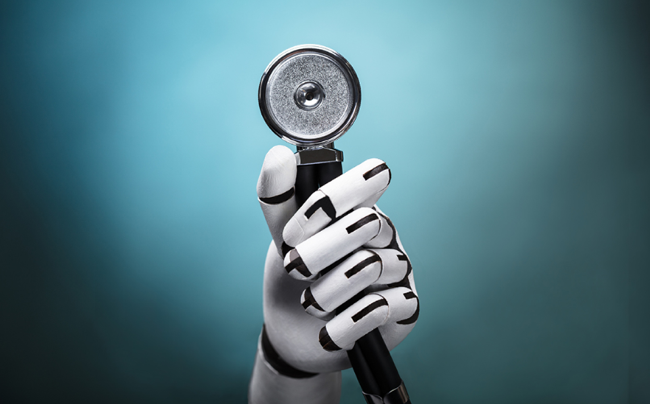
by Editor | Oct 27, 2019 | News
Artificial intelligence (AI), including machine learning, presents exciting opportunities to transform the health and life sciences spaces. It offers tantalizing prospects for swifter, more accurate clinical decision making and amplified R&D capabilities. However, open issues around regulation and clinical relevance remain, causing both technology developers and potential investors to grapple with how to overcome today’s barriers to adoption, compliance, and implementation.
Here are key obstacles to consider and how to handle them:
Developing regulatory frameworks. In 2017, the FDA released its Digital Health Innovation Action Plan to offer clarity about the agency’s role in advancing safe and effective digital health technologies, and addressing key provisions of the 21st Century Cures Act.
Achieving FDA approval. To account for the shifting FDA oversight and approval processes, software developers must carefully think through how to best design and roll out their product so it’s well positioned for FDA approval, especially if the software falls under the agency’s “higher risk” category.
AI is a black box. Besides current regulatory ambiguity, another key issue that poses challenges to the adoption of AI applications in the clinical setting is their black-box nature and the resulting trust issues.
Lower hurdles in life sciences. While AI’s application in the clinical care setting still faces many challenges, the barriers to adoption are lower for specific life sciences use cases. For instance, ML is an exceptional tool for matching patients to clinical trials and for drug discovery and identifying effective therapies.
But whether it’s in a life sciences capacity or the clinical care setting, the fact remains that many stakeholders stand to be impacted by AI’s proliferation in health care and life sciences. Obstacles certainly exist for AI’s wider adoption — from regulatory uncertainties to the lack of trust to the dearth of validated use cases. But the opportunities the technology presents to change the standard of care, improve efficiencies, and help clinicians make more informed decisions is worth the effort to overcome them. These challenges and opportunities of AI in health care is also mentioned in AI Ethics and Practice Indexes to include standards and frameworks for constructive use of AI in the society with the collaborations of different organizations and entities.
The original article can be found here.

by Editor | Oct 20, 2019 | News
On October 12, 2019, Mr Nguyen Anh Tuan, co-founder and CEO of the Boston Global Forum, spoke about the 7 layer model of AI World Society, the 7 centers of power of AIWS Social Contract 2020, and AI-Government at the Plenary Session “Political Power in the Digital Age” of the Riga Conference 2019.
There were international presidents, prime minister, ministers, and thought leaders attending and speaking at the conference. This is the 14th conference of its kind.
President of Latvia Vaira Vike-Freiberga is the founder of the annual Riga Conference from 2006, with US President George W. Bush participating as a speaker.
The video of the Plenary Session “Political Power in the Digital Age” can be found
here.

by Editor | Oct 20, 2019 | News
This year’s Policy Dialogue offers a platform for dialogue on one of the most important issues facing leadership today: Digital Transformation and the Future of Democracy. In the past twenty years, artificial intelligence and internet technologies have irrevocably changed the fabric of society and government at large. Recently, there has been much focus on the negative effects of AI and internet technologies on the social structure, such as fake news, made with algorithms to target the most suitable and insidious data collection, used to influence voting patterns. Indeed, the use of AI may pose a challenge to democracy, but, if handled correctly, it can also bring more and better democracy. As we near the third decade of this millennia and technologies continue to develop at such a rapid rate, democracies cannot afford to fall behind. The digital is now political and therefore requires a political response. In this dialogue, we will ask: How can we anticipate the fast-changing world of AI and reap the benefits while countering the risks it poses to democracies?
In order to answer this important question, three topics will be discussed and presented by leading experts in the global field of AI:
- Fundamental Rights in the Digital Age
- Data Economies and the Future of Social Contract
- Trust and Public Debate in the Disinformation Age
Multi-sectorial working groups have then been established for each of these themes with the objective of formulating policy recommendations that will be brought together as a Call for Action to be taken forward by WLA–CdM and its partners.
Professor Alex Sandy Pentland, Direcrtor of Connection Science of MIT, and Mr. Nguyen Anh Tuan, CEO of the Boston Global Forum, will speak about the “AI World Society Social Contract 2020 as Framework for Peace and Security in the 21st Century” on October 21, 2019.

by Editor | Oct 20, 2019 | News
October 25, 2019, Friday, 8:15 Breakfast Keynote: AI World Society Roundtable on AI and Healthcare.
Moderator: Ed Burns, Site Editor, TechTarget
Professor David Silbersweig, Harvard Medical School, Board Member of Boston Global Forum will talk as a panelist. He will introduce the concepts of AI-Healthcare.
Professor David Silbersweig is one of the co-founder of AIWS Social Contract 2020 and other initiatives of AI World Society. AI-Healthcare is an initiative by AI World Society (AIWS) involving deeply applied AI in healthcare.

by Editor | Oct 20, 2019 | News
It is my distinct honor today to recognize President Vaira Vike-Freiberga as the recipient of this year’s Boston Global Forum World Leader for Peace and Security Award.
I’m Michael Dukakis, co-founder and chair of the Boston Global Forum, which is dedicated to analyzing and finding solutions and initiatives to help create a world of peace, security, and cooperation.
We’ve been fortunate to have worked with President Vike-Frieberga in recent years. The first contact with you for many of us in Boston was when you were a senior fellow at Harvard University’s Institute of Politics. Since then you have been a frequent participant in the proceedings of the Boston Global Forum as well as serving as a member of our board of international thought leaders. You have made significant contributions to our AI World Society Initiative.
Additionally, our award is given in recognition of your many other contributions to peace and security in your home country, the Baltic Region, Europe, and internationally.
You have had a rich career, serving for two terms as President of Latvia, at the time it joined the European Union. During your last year in office, Latvia’s GDP grew by more than 10 percent—among of the highest in the world.
You have been a leading voice in strengthening the Baltic region, most continuously but not solely through the Riga Conference, which you founded in 2006, which meets annually to discuss critical defense and foreign policy issues.
Europe has benefitted from your efforts, notably through your leadership as vice-president of the Reflection Group on the long-term future of the EU, membership in the European Council on Tolerance and Reconciliation, and as chair of the European Commission High Level Expert Group on Media Freedom.
And it goes without saying, you were a founding member of the World Leadership Alliance-Club de Madrid and are concluding your second term as its president in December 2019.
For these many reasons, Madam President, Boston Global Forum is honored to join the long list of your admirers by presenting you with our annual World Leader for Peace and Security Award.
We will also be celebrating your contributions to world peace and security at our Global Cybersecurity Day, December 12, 2019 at Harvard University.
Thank you for your participation in the work of Boston Global Forum, your many contributions to the betterment of all people, and for your distinguished career as an international leader.
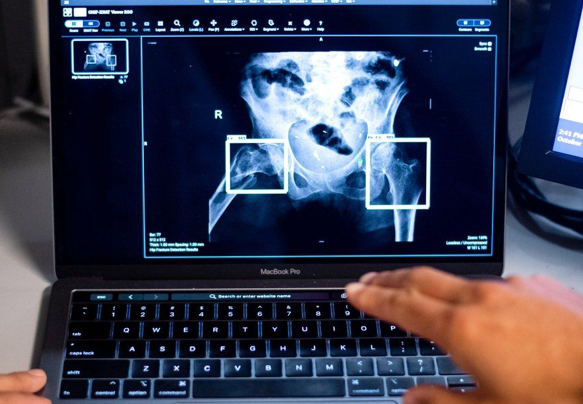
by Editor | Oct 20, 2019 | News
UC San Francisco is launching a new center to accelerate the application of artificial intelligence (AI) technology to radiology, leveraging advanced computational techniques and industry collaborations to improve patient diagnoses and care.
The Center for Intelligent Imaging, or ci2, will develop and apply AI to devise powerful new ways to look inside the body and to evaluate health and disease. Investigators in ci2 will team with Santa Clara, Calif.-based NVIDIA Corp., an industry leader in AI computing, to build infrastructure and tools focused on enabling the translation of AI into clinical practice.
“The Center for Intelligent Imaging will serve as a hub for the multidisciplinary development of AI in imaging to meet unmet clinical needs and provide a platform to measure impact and outcomes of this technology,” Christopher Hess, MD, PhD, chair of the UCSF Department of Radiology and Biomedical Imaging said. “The result will be more efficient, higher-value imaging for patients within and outside of UCSF.”
According to Michael Dukakis Institute for Leadership and Innovation (MDI), AI can be a force for helping people achieve well-being and happiness, unleash their potential, obtain greater freedom, relieve them of resource constraints and arbitrary/inflexible rules and processes, and solve important issues, such as SDGs.
The original article can be found here.








